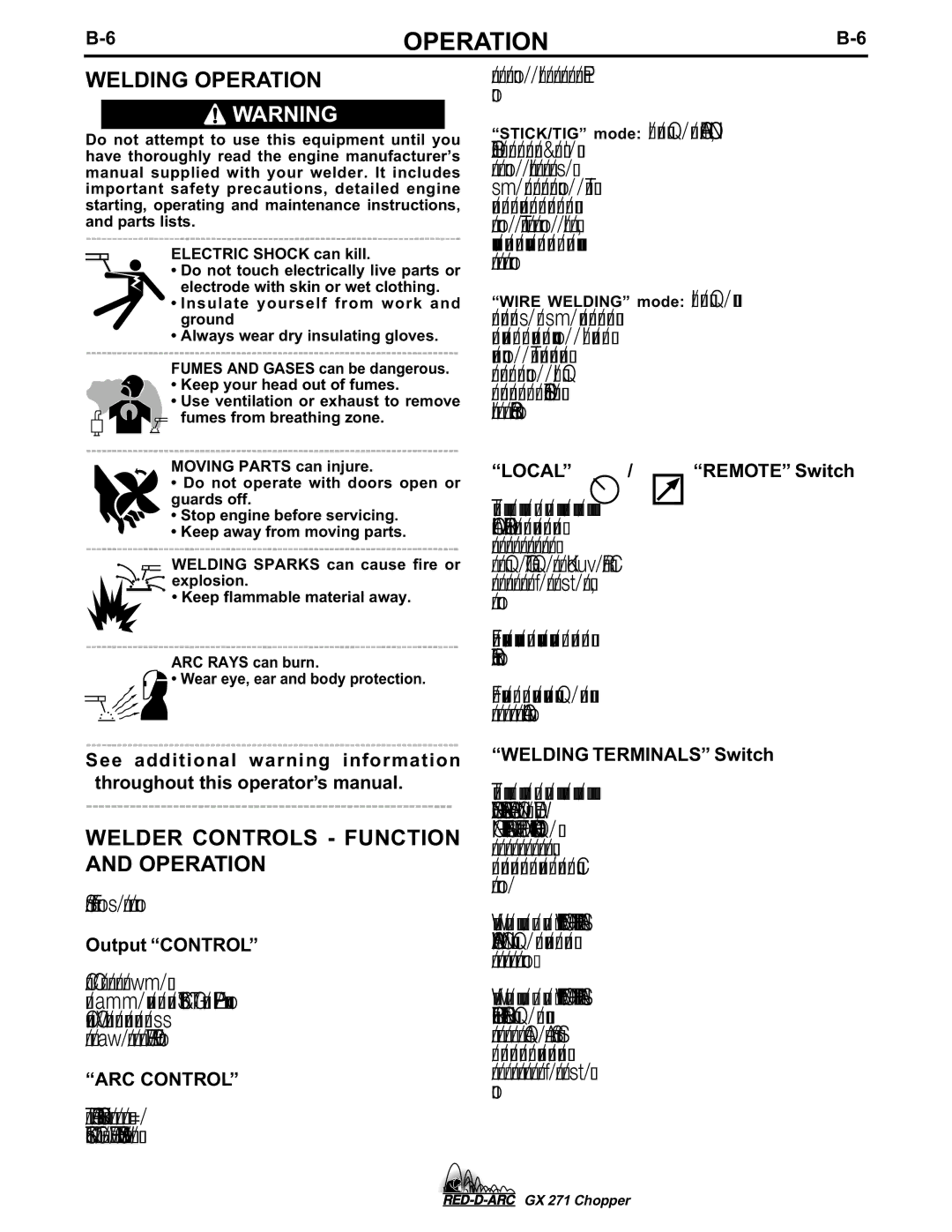
OPERATION | ||
|
|
|
WELDING OPERATION
![]() WARNING
WARNING
Do not attempt to use this equipment until you have thoroughly read the engine manufacturer’s manual supplied with your welder. It includes important safety precautions, detailed engine starting, operating and maintenance instructions, and parts lists.
ELECTRIC SHOCK can kill.
•Do not touch electrically live parts or electrode with skin or wet clothing.
•Insulate yourself from work and ground
•Always wear dry insulating gloves.
FUMES AND GASES can be dangerous.
•Keep your head out of fumes.
•Use ventilation or exhaust to remove
fumes from breathing zone.
MOVING PARTS can injure.
•Do not operate with doors open or guards off.
• Stop engine before servicing.
•Keep away from moving parts.
WELDING SPARKS can cause fire or
![]()
![]()
![]()
![]()
![]() explosion.
explosion.
• Keep flammable material away.
ARC RAYS can burn.
• Wear eye, ear and body protection.
See additional warning information throughout this operator’s manual.
WELDER CONTROLS - FUNCTION AND OPERATION
See Figure B.1 for control locations.
Output “CONTROL”
Continuous CC welding current control from 20 amps to 300 amps in the STICK/TIG and PIPE modes. Continuous CV welding arc voltage control from 11 volts to 32 volts in the WIRE FEED mode.
“ARC CONTROL”
The “ARC CONTROL” is active in two modes: “STICK/TIG” and “WIRE WELDING” and has different
purposes in each mode. It is not active in the “PIPE” mode.
“STICK/TIG” mode: In this mode, the “ARC CON- TROL” knob sets the short circuit (arc force) current during stick welding. Increasing the number from 1 to 10 increases the short circuit current. This prevents sticking of the electrode to the plate at low welding current settings. This also increases spatter. It is rec- ommended that the control is set to the minimum number without electrode sticking.
“WIRE WELDING” mode: In this mode, increasing the number from 1 to 10 changes the arc from soft and washed in to crisp and narrow. It acts as an inductance control. The proper setting depends on the application and operator preference. In general, Mig welding performs best in the “SOFT” range and Innershield in the “CRISP” range.
“LOCAL” | / | “REMOTE” Switch |
The toggle switch on the control panel labeled “LOCAL/REMOTE” gives the operator the option of controlling the output at the welder control panel or at a wire feeder, TIG amptrol, or a K857 Remote Control that is connected to either the 6 pin or 14 pin amphe- nol connector.
For remote control the toggle switch is set in the “REMOTE” position.
For control at the welder control panel, the toggle switch is set in the “LOCAL” position.
“WELDING TERMINALS” Switch
The toggle switch on the control panel labeled “WELDING TERMINALS ALWAYS ON” and “WELD- ING TERMINALS REMOTELY CONTROLLED”, is used to control the operation of the solid state contac- tor which allows for the selection of “Hot” or “Cold” welding terminals.
With the switch in the “WELDING TERMINALS ALWAYS ON” position, the contactor is closed and the welding terminals are always “Hot.”
With the switch in the “WELDING TERMINALS REMOTELY CONTROLLED” position, the contactor operation is controlled by an Amptrol, Arc Start Switch or some other type of triggering device through the use of a control cable connected to the 6 pin or 14 pin amphenol.
GX 271 Chopper
